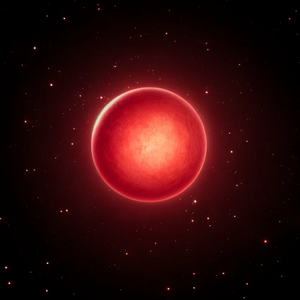
| Type: | M4V Red Dwarf |
| Radius: | 235,000 km (0.36 that of Sol) |
| Mass: | 4.48 x 1029 (0.23 of Sol) |
| Temperature: | 2700 K |
| Luminosity: | 2.42 x 1024 (0.01 of Sol) |
| Ecosphere: | Between 0.083 and 0.222 AU |
| Location: | Beeria Sector 2 ly from the Hubroid Star System 3 ly from Sigma Tamelos Sector 9 ly from the Eaiza Star System |
Tovina is a red dwarf star with 4 planets. In 2387 the system was surveyed by the Insane Prince (STV-1027) under the command of Vlad Zima in connection with Operation Flintlock.
Tovina Prime
| Class: | A |
| Distance: | 1.52 x 107 km |
| Period: | 24.88 Days |
| Radius: | 7,025.55 km (1.1 Earth) |
| Gravity: | 1.17 G |
This planet has dense field of planetary rings of heavy metal fragments and highly radioactive thick atmosphere dominated by sulfur dioxide winds.
Tovina 2
| Class: | A |
| Distance: | 3.11 x 107 km (0.21 AU) |
| Period: | 72.92 Days |
| Radius: | 5,593.95 km (0.88 Earth) |
| Gravity: | 0.82 G |
This planet has a series of 3 distinct planetary rings mostly small asteroids, possibly once a system of moons. The atmosphere is thin and made up of carbon dioxide, nitrogen dioxide, and sulfur dioxide.
Tovina 3
| Class: | C |
| Distance: | 4.90 x 107 km (0.33 AU) |
| Period: | 144.2 Days |
| Radius: | 10,267.37 km (1.61 Earth) |
| Gravity: | 1.67 G |
There are 5 small steroidal moons in orbit around this planet. The planet itself has no atmosphere at all, made up of mostly anthracite and basalt. In 2387, Solas Tempus placed the Tovina Terminal on this world, as a Hermod Gate / research facility after survey by the Insane Prince that same year.
Tovina 4
| Class: | I |
| Distance: | 8.07 x 107 km (0.54 AU) |
| Period: | 304.2 Days |
| Radius: | 29,924.38 km |
| Gravity: | 1.47 G |
This world has a system of rings, primarily made of frozen methane and other hydrocarbons. It has a small rocky core with thin oceans of ammonia, methane, and other small chain hydrocarbons. The atmosphere is primarily hydrogen and helium with trace amounts of hydrocarbons in the lower atmosphere.